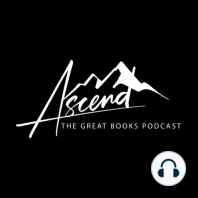90 min listen

Iliad: Book 17 | Menelaus’ Finest Hour
Iliad: Book 17 | Menelaus’ Finest Hour
ratings:
Length:
69 minutes
Released:
Apr 23, 2024
Format:
Podcast episode
Description
Dcn. Harrison Garlick and Adam Minihan discuss Book 17 of the Iliad: Menelaus' Finest Hour. Summary of Book 17What is the "dark heart" of Hector?Can human agency affect fate?What about the horses of Achilles?Check out our 115 Question & Answer Guide on the Iliad. But grief bore down on Hector, packing his dark heart.Homer (17.92) 75. What happens in books seventeen?The body of Patroclus still lays on the plains outside of Troy. Menelaus, the Spartan king, slays Euphorbus, the Trojan who had speared Patroclus (17.51). Apollo spurs Hector to fight for the body of Patroclus (17.84), and Hector is able to remove Patroclus’ gear—but Ajax returns and stops him from decapitating the corpse (17.146). Glaucus, friend of the dead Sarpedon, chastises Hector for retreating from Ajax and implies that if Hector was more like Ajax, they could have saved the body of their comrade, Sarpedon (17.172). Hector retorts he is no coward, but the will of Zeus forces cowardice upon him (17.201). Hector then puts on the armor of Achilles, stripped from Patroclus, and Zeus, taking pity on Hector, grants him power and makes the armor fit well—but also states Hector will never return home again (17.230).Hector leads the Trojans in battle for the body of Patroclus (17.263), and the Achaeans, led by giant Ajax and Menelaus, mount a defense (17.290). The Achaeans take the advantage, and Apollo spurs Aeneas to rally the Trojans (17.379), but Ajax and the Achaeans remains stalwart in their defense (17.420). Zeus shifts his favor to the Achaeans and sends Athena to rouse their fighting spirits (17.623). Apollo chastises Hector, and as Hector charges to the frontlines, Zeus releases a bolt of lightning to show he now favors the Achaeans (17.670). Giant Ajax laments: “Dear god, enough! Any idiot boy could see how Father Zeus himself supports these Trojans” (17.707). Zeus pities Ajax and thus removes his storm clouds from the battlefield and “the whole war swung into view” (17.729). Menelaus, at the suggestion of Ajax, sends Antilochus, son of Nestor and “a favorite of Achilles,” to go tell Achilles what has happened (17.776).[1] The Achaeans grab the body of Patroclus and bear him back to their ships, as the two great Aeantes hold off the Trojans (17.823, 843); until Hector and Aeneas come leading the Trojans “like a crowd of crows… screaming murder,” and the Achaeans break and flee for the ships (17.846). 76. What should we make of the “dark heart” of Hector?In book seventeen, we are introduced to the “dark heart” of Hector (17.92). The “dark heart” is presented within the juxtaposition of Apollo spurring Hector to fight (17.84), and Hector surveying the reality of the battlefield (17.93).[2] It is a moment of “grief” for the Trojan Prince (17.92). Hector does charge the front line “loosing a savage cry, and flaring on like fire, like the god of fire” (17.96). Such a reaction to the spurring of a god seems normative in the Iliad, but what seems abnormal is the moment of grief in between. Moreover, the pattern occurs again later in which Apollo again spurs Hector, Hector bears a “black cloud of grief,” and then charges the frontlines (17.660, 670).The “dark heart” of Hector gives further credence to his role as the tragic, tortured hero
Released:
Apr 23, 2024
Format:
Podcast episode
Titles in the series (23)
How to Read the Great Books Well by Ascend - The Great Books Podcast